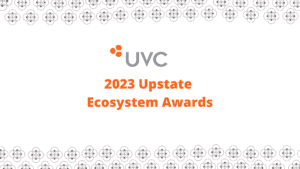It’s shortsighted to simply point to taxes in Upstate New York as the reason for slow business growth. Economic policy is a complicated, multi-factor puzzle. Here’s a tall tale of cutting taxes, and how real reform could actually help Upstate startups.
Three years ago I was part of a group effort to bring an exciting new program to Buffalo called Startup Grind. The idea was to create fireside chats with founders of Upstate startups and prominent members of our startup ecosystem. These guests impart wisdom on others hoping to make it in this high-paced, high-risk industry. My part, aside from planning and organizing, was to write. Or perhaps more accurately, to attempt to write. And attempt I did. What’s important here is that I borrowed some lessons from Eric Ries’ The Lean Startup and learned how to quickly fail at writing, and ultimately pivot.
Which brings us to today and finds me writing for Upstate Venture Connect—a coordinated effort across Upstate New York to cultivate and grow a vibrant startup ecosystem. Similar idea. Larger audience.
While my plans of regularly publishing for Google Entrepreneur’s Startup Grind may not have panned out as expected, I at least managed to ink out a couple of posts. One of which was a piece which examined the numbers influencing whether Buffalo could ultimately be a top city for Upstate startups. I looked at the relative costs relating to wages, income tax, sales tax, property tax, housing costs, and cost of office space. Despite complaints from organizations like Unshackle Upstate, the objective costs of doing business in Upstate New York is actually comparable with startup hotbeds like New York City, Silicon Valley and Boston.
With the unquestionable success these cities have seen, it is shortsighted to simply point to taxes in Upstate New York as the reason for slow business growth. Admittedly it’s a great soundbite and plays well on talk radio, but economic policy is a complicated, multi-factor puzzle. In fact, anecdotally it would seem that the opposite is most often true—cities with higher taxes, dense walkable communities, multi-modal transportation options, more social services, and diverse communities tend to attract and develop far more successful companies.
Now make no mistake, not everything in Upstate is rainbows and butterflies. While my 2014 article ultimately concluded that Buffalo could be a top city for startups (and in many ways it is already becoming one), I was careful to examine some of the areas that could use improvement for us to truly compete with top startup cities across the country. In particular, the article noted the funding parity for Upstate startups. Simply put, access to seed and venture capital for high growth companies in Upstate New York is where we fall short—and epically so.
Programs like StartupNY, 43North, Innovate NY Fund Program, LaunchNY and Genius NY have however increased the access to capital and certainly raised the profile of Upstate as a place to start and grow a business. We’ve made some strides over the last three years but there is no disputing that there is still a long way to go (stay tuned in the coming months for an in-depth examination of capital deployment in Upstate New York).
So what more could we be doing to further accelerate funding in the startup ecosystem in Upstate New York?
1. Use tax policy to incentivize investment in Upstate Startups
Initially there should be a distinction drawn between using tax policy to attract existing companies to Upstate New York and using tax policy to incentivize investment in high-growth early stage companies. Recently I had the pleasure of an online exchange with a friend who questioned this very policy. The inquiry was this: since Upstate New York was failing to compete when it comes to access to capital, shouldn’t we reduce taxes to try and incentivize other businesses? Well let’s give some thought to who those other businesses would be. If we aren’t creating an ecosystem that encourages and facilitates organic growth from startups (i.e., new dollars into an economy) all we’re really doing is using tax policy to attract existing businesses to transfer assets from another market. Essentially, this is an economic-policy-shell-game that shifts money from one community to another and calls it growth. True growth, real sustainable economic growth is finding a way to create an economy that is ultimately self-perpetuating. If we are not working to accomplish that, then tell me, what’s the point?
Tax policies like StartupNY are intended to solve this complex economic Rubik’s Cube. The operative word is of course “intended.” While StartupNY is a great idea in theory, it mostly benefits companies after they start growing. Since most startups don’t make a profit for at least the first few years of existence, tax breaks on things like income do not themselves create much of an incentive to start a business in Upstate New York. Furthermore, StartupNY provides very little incentive to investors to deploy capital in Upstate New York.
Again, one of the primary disadvantages when comparing Upstate New York to other startup hotbeds is access to capital. So how do we go about attracting additional capital from investors north of the five boroughs? Well it just so happens that we can look to these other cities for inspiration.
Austin, Texas for example has zero capital gains tax. New York’s capital gains tax on the other hand is nearly 9%. But how do we leverage a reduction of taxes (otherwise revenue for government services) into actual growth (which at least theoretically creates additional revenue from exponential growth)? It is certainly easy to see how a tax credit for all capital gains in NY could be exploited without a tangible benefit to anyone other than the investor. That would certainly defeat the purpose of such a tax credit.
That doesn’t mean however the goal of increased access to capital cannot be achieved through tax policy. It simply means we need to plan for the abuse and ensure that capital invested is growing the tax base, creating jobs and retaining the best and brightest in New York state. By creating a tax credit for investments in qualified Upstate New York startup businesses (reasonable minds can disagree on the definition of a startup but hopefully our legislature can at least handle that task), the goal would be to encourage investment in businesses in Upstate New York by reducing the costs associated with an exit event such as in IPO or an acquisition. More investment means more available capital. And more capital means more high growth startups.
2. Permit County IDAs to invest in early stage startups
An additional opportunity for Upstate New York to use public policy to increase access to capital is through existing Industrial Development Agencies (IDAs). Presently the New York State Comptroller has taken the position that utilizing IDA funds for equity investments is not in and of itself a permissible “project” within the scope of New York State law. While equity investments by an IDA may be able to be used in conjunction with an existing approved project (i.e., lease back, sales tax exemption or mortgage tax exemption), given the fact that most early stage startups do not have a need for such public finance incentives, the reality is that there is very little practical application for this tool.
An easy fix which could free up more capital for high-growth startups? Get the New York State legislature to modify the definition of project so that IDAs can make equity investments into early stage companies without cumbersome attachments to other projects. IDAs would likely (and would be wise to) make follow-on investments with other lead investors such as venture capital and angel funds who are experienced in early stage investments and who have the internal infrastructure for due diligence.
Upstate New York has made tremendous policy recently in encouraging the development of high-growth startups, but we still have plenty of room for improvement.
So here’s a recommendation for the New York State legislature on how to do just that: propose an “Upstate New York Jobs Act” and create policy initiatives which will encourage the investment of capital and cultivate the success of high-growth Upstate startups. Doing so will ensure that we are competitive with startup meccas across the nation and do everything we can to create sustainable growth for generations to come.


